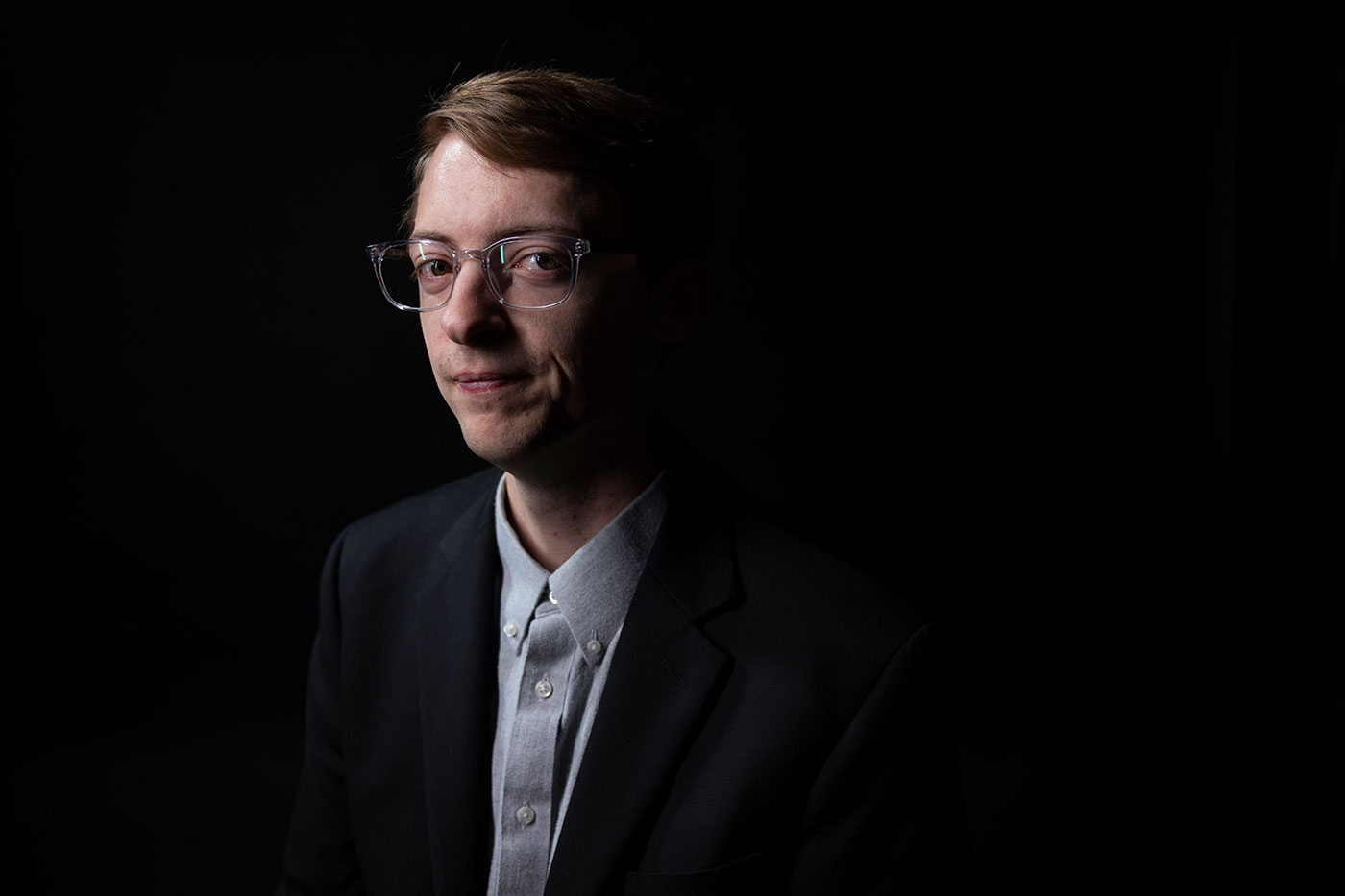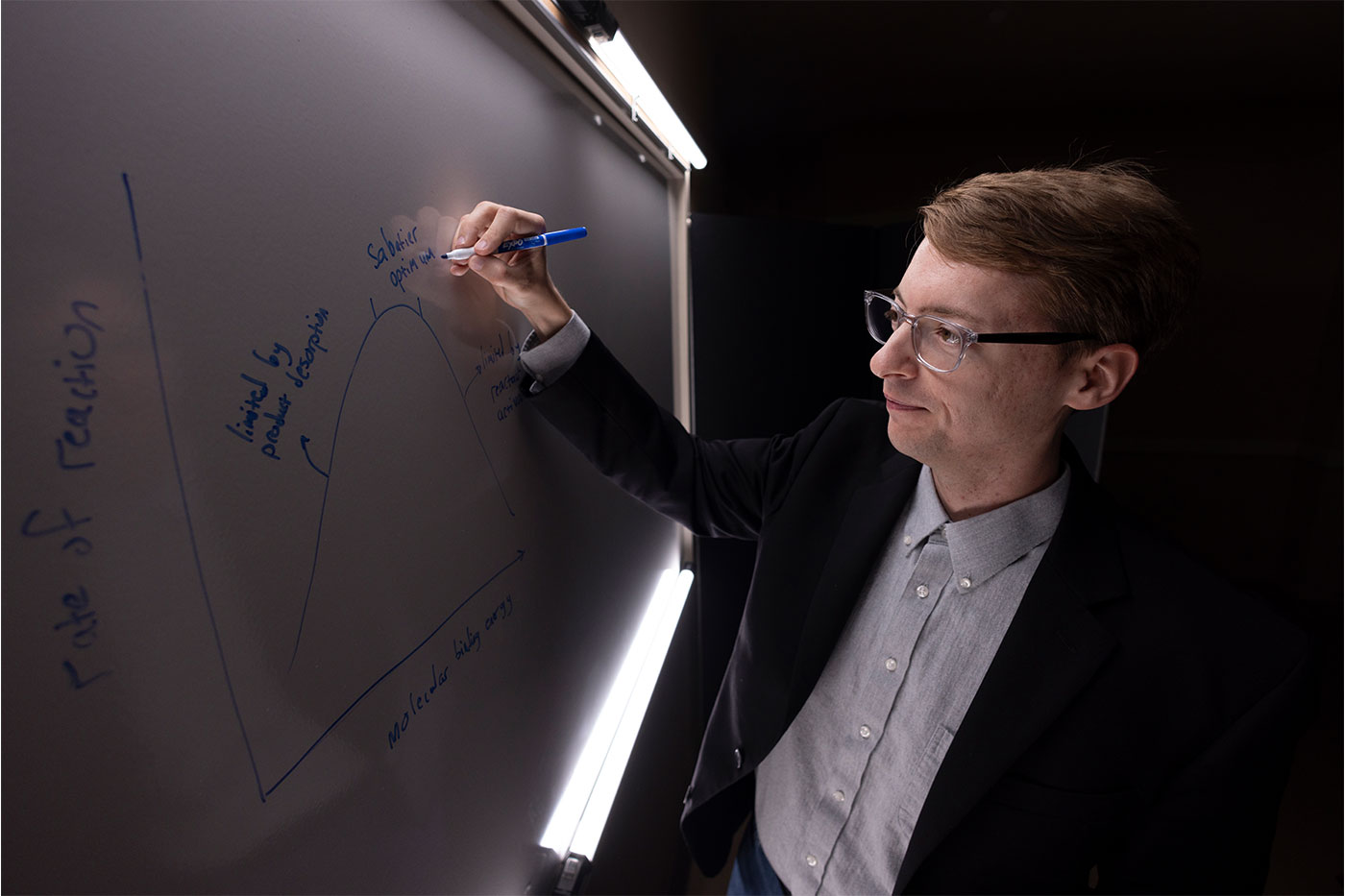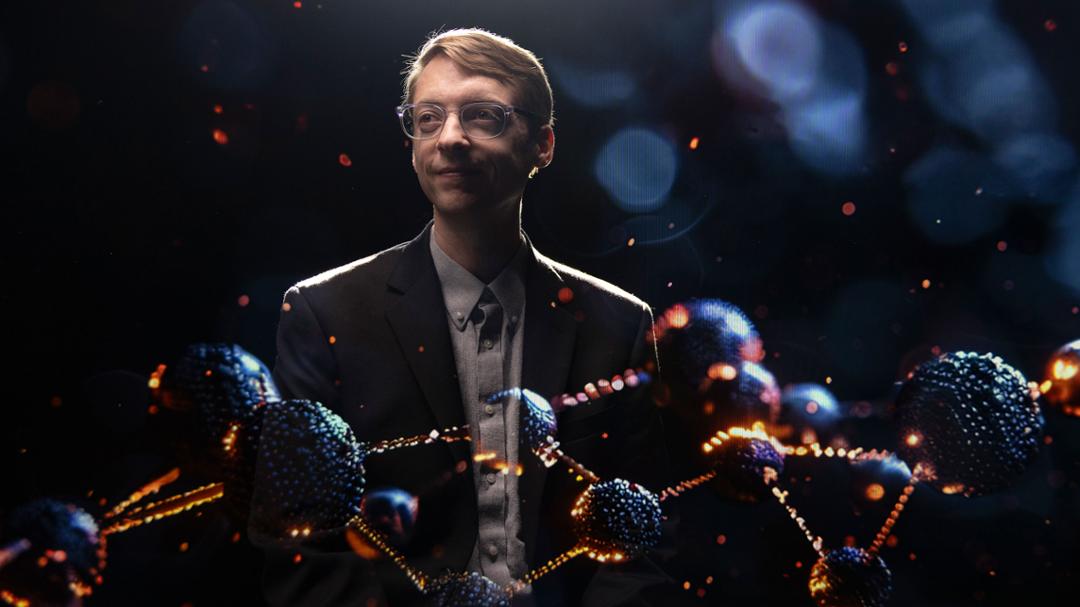What started as a way for Joe Gauthier to get the most out of his education turned into a calling to create a more sustainable world.
Curiosity drives Joseph “Joe” Gauthier’s Computational Catalysis Research Lab in the Department of Chemical Engineering at Texas Tech University.
Rooted by an appreciation for nature stemming from family camping trips in the forests surrounding his hometown near Dayton, Ohio, Gauthier wants to leave this world better than he found it by creating electronic alternatives to chemical processes.
It’s that same knowledge-hungry trait that once surged on the campus of Ohio State University during his first year of college in 2011. Gauthier was placed in an honors dorm with second-year students who were already engrossed in research, and he became increasingly fascinated as he watched them work on their projects.
“I finally asked one of them the question, ‘What is research?’” he recalled.
The clarity he received was compelling, yet Gauthier had centered his future around other aspects of himself. He knew he had a knack for math and science partially influenced by his father, who is a mechanical engineer. With a “Why not?” approach, he began to consider similar careers.

This was how he discovered the field of chemical engineering boasted one of the highest average starting salaries at the time – a perk particularly appealing to Gauthier. Money was tight for him, which was the primary reason he applied only to Ohio State and one other college.
The hard truth was he barely had enough savings to pursue a college education with his formative high school years taking place during the Great Recession of 2007-2009.
“Part of the problem was that for my parents, when they went to school in the late 1970s to early 80s, they could work part-time over the summer and pay for years of college expenses,” he said. “That’s not really the case at all anymore, and it wasn’t the case when I was heading to college.”
Consequently, midway through his first year, Gauthier faced dropping out of college. This was difficult to come to terms with, since he was already headed down a path he believed would lead to a bright future. He was devastated.
But fortunately, not for long.
“It’s a source of privilege for me that a family member stepped up and basically helped cover the balance,” Gauthier humbly noted.
The act of kindness bought Gauthier enough time to secure loans and scholarships that would help cover the rest of his tuition. With a sense of relief and reassurance, he set forth to maximize his college experience, most effectively through research.
“That was really what led me to start reaching out about any extra learning opportunity I could do,” he recalled. “That’s what I understood research to be at the time, and so I wanted to take advantage of it.”
Again, good fortune found Gauthier in the form of other individuals who saw his eagerness for education. Kurt Koelling, a since retired research adviser and professor, taught him the ins and outs of graduate school, took him under his wing and into a lab to experiment with polymers. During this time, Gauthier found research would fulfill several lifestyle choices that meshed well with his personality: independence with the chance to work on any projects he obtained funding for, as well as a flexible schedule.
After four years, he gained enough experience to form a competitive application that earned his admittance to graduate school at Stanford in 2015.
Gauthier spent the next five years as a mentee under Jens Nørskov, a theoretical catalysis scientist, building up methods to study charge transfer processes with density functional theory. He even traveled to Nørskov’s home country of Denmark for a study abroad opportunity that broadened his world perspective. He shared this remarkable experience alongside his newlywed wife, Hannah – his high school sweetheart who had developed a knack for research within the field of animal science.
In true engineering fashion, Gauthier ensured the foundation of his research career was solid by the time he earned his doctorate in May 2020 and became a postdoctoral associate at the University of California, Berkeley and Lawrence Berkeley National Laboratory. In this short chapter, he had what he calls the luxury of time to contemplate high-level problems like sustainability and climate change to identify sub-problems he could address.
“Texas Tech was the right way to go.”
However, the COVID-19 pandemic was in full force, and the couple’s restlessness grew along with the restrictions in California. Their desire for a new scene would require a difficult choice between Gauthier working at a national lab in Colorado or accepting a tenure-track position at Texas Tech.
That was, until Hannah was also offered an instructor position in the Animal & Food Sciences department of the Davis College of Agricultural Sciences & Natural Resources.
“Solving that two-body problem made the decision easier,” he remembered. “Texas Tech was the right way to go.”
Resolute Research
The couple was comforted to find Lubbock and the surrounding towns not too different from their rural hometowns. Gauthier felt pleasantly surprised there was much more sustainability work being done in the area than he anticipated.
“The potential for sustainability in this region is kind of understated,” Gauthier said, noting the plentiful wind and solar resources. “I really think if we can make some of these sustainable solutions make sense economically, the rest is just going to fall into place.”
With this hefty goal in mind, Gauthier entered the Edward E. Whitacre Jr. College of Engineering as an assistant professor of chemical engineering. With haste, he began to chase projects he considered before he accepted this position – work related to the focus on efficiency he developed growing up in an engineering household.

“I see a lot of the unsustainable practices that govern our society as an inefficiency, and it’s going to need to change eventually,” he said. “We’re just running the clock down, essentially. So, addressing that is something I care quite a lot about.”
Before long, Gauthier created a space dedicated to these aspirations through his Computational Catalysis Research Lab. There, he directs multidisciplinary research into the connection between a material’s atomic scale structure and its macroscopic behavior so he can design better materials in-silico (by means of computer modeling or simulation).
In other words, Gauthier is searching for economical alternatives to chemical processes through catalysts, which are substances that accelerate chemical reactions without being destroyed in the process. He is hopeful these tools could lead to a transition from fossil-fuel-based to renewable energy, reduce carbon emissions and create green energy storage. But before this can happen, he needs to understand all angles of the issue at hand.
For starters, if green hydrogen is to be considered a serious energy contender by businesses, it will have to become the most economical option. Unfortunately, the most affordable production option available is hydrogen generated from the steam reforming of methane extracted from the ground.
A much more sustainable method is when hydrogen is formed by the electrolysis of water, but the process comes with a high price tag. Through analyzing National Renewable Energy Lab reports, Gauthier has discovered one of the whys behind the expense: part of the electrolyzer dissolves with time under the acidic, oxidizing conditions.
“The only thing that can really withstand those conditions are oxides of iridium, which just so happens to be among the rarest elements in the Earth’s crust,” he mused. “It’s extraordinarily expensive. We don’t have enough of it to really scale green hydrogen production.”
While this may seem like a dead end to some, it was only the beginning of a complex equation for Gauthier. He has challenged himself and his team to understand why iridium oxide eventually dissolves so they can engineer preventive measures and further extend its service.
This will require asking, “What properties can predict which iridium atom is most likely to leave the surface to dissolve?” The answers will face another challenging round of follow-up questions like, “What can we do to the surface to help inhibit that process?” or “What are cheaper materials that could possibly withstand these conditions?”
Once these details are compiled, Gauthier can begin engineering a catalyst that will fit his high standards: reactive so the reaction proceeds quickly over it, selective so that other unwanted reactions do not proceed quickly, and stable so it will last for years or even decades.
“If you have to change out the catalyst every 12 hours, it’s really not going to work economically,” he reasoned. “The lifetime of these catalysts matters beyond a 12-hour test. I’m happy to see the field start to take stability more seriously, and I hope that we can be kind of in front of that wave.”
Future Foundation
Gauthier’s work on these fronts is well received so far. He has had at least 11 corresponding papers published this year alone with the help of the graduate and undergraduate students who have joined his lab.
He acknowledged he couldn’t make these strides without them.
“They’ve really been wonderful to work with and I feel very lucky,” he shared.
The feeling is mutual for Samuel Olusegun, one of the students benefiting from Gauthier’s lab who is listed as a co-investigator for most of his papers. Olusegun was one year into his chemical engineering doctoral program in summer 2022 when he sought out this opportunity due to Gauthier’s extensive background and the compelling projects he proposed.
He calls that decision one of the best he has made in a long time.
"Dr. Gauthier is an excellent mentor."
“It’s been incredible,” Olusegun said. “Dr. Gauthier is an excellent mentor. He embodies all the qualities of a great mentor. A few personal traits I admire are his brilliance, strong work ethic and dedication. As a mentor, he’s always available and approachable, open to suggestions, and consistently offers advice and motivation when I face personal or research-related challenges.
“It is near impossible to capture the full extent of his influence on me and my colleagues, but I can confidently say that he is a perfect example of outstanding character and exceptional mentorship.”
At first, Olusegun had almost no knowledge of catalysis or electrochemistry. But through Gauthier’s guidance, in less than a year, he was honored by the North American Catalysis Society with the prestigious Kokes Travel Award.
The experience and knowledge he continuously gains through lab work has Olusegun confident about his future.
“Working with Dr. Gauthier has equipped me to be able to excel in any career path I choose – whether in academia, core research, industry or even starting my own business,” he said. “We all aim to be well-rounded individuals, and working with him has brought me closer to that goal.”
This couldn’t make Gauthier prouder as someone who has benefitted from mentorship himself. He is sometimes asked by prospective lab members what his students accomplish after graduation, but Olusegun (his most senior student) still has one year to go.
He remains highly optimistic about that future report.
“I believe when it comes time for graduation, my students will be competitive for really good jobs,” he said. “I think they’re getting good experience, and I hope having the opportunity to work on sustainability for just a few years will influence them to think about that moving forward.”
Accordingly, Olusegun believes advancing sustainability and eco-friendly chemical production is critical to protect the planet. Gauthier’s more difficult challenge is getting other industries to reach the same understanding without the need for government intervention.
That is Gauthier’s true catalyst to power through more challenging aspects of his job, like the steady rejection commonly associated with grant proposals. All he has to do is think back to his training – of the people who have not only invested but also believed in him – and marvel at his progress.
Chemical engineering may have started strictly as a financial decision, but it turned into a lifelong purpose.
“You have to build a thick skin, put your head down and do your work,” he expressed. “My long-term career goal is to make a meaningful impact on sustainability and climate change. If we can do that, then I would die a happy person.”

